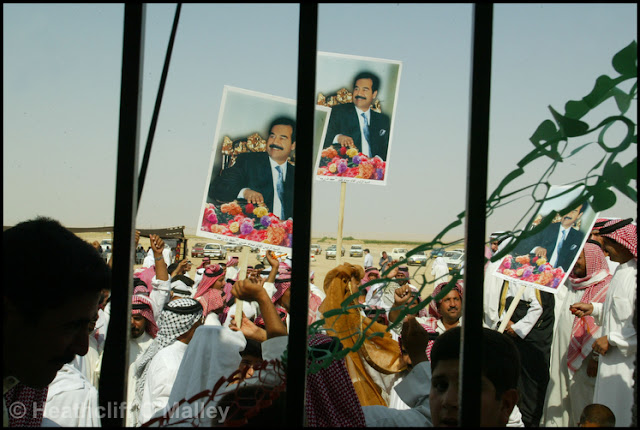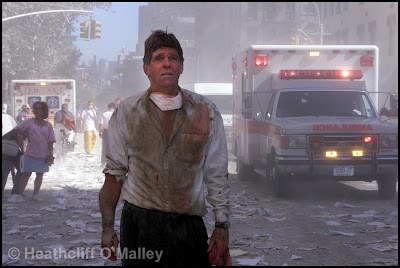Iraq 10 Years On
14 March 2013 , Falkland Islands
Before the dust had even begun to settle after the events of
9/11 and the 2001 conflict in Afghanistan, I was despatched to Iraq by the
Daily Telegraph to cover the final months of Saddam Hussein’s brutal Baathist regime.
The evenings were often spent in open-air restaurants in the more affluent parts of town, at
the closing down parties of the numerous embassies in town or back at
the Al Rashid hotel where room 222 became “Le Club Trois Deux”. Photographers
and correspondents from the world’s media would stop buy for a glass of Arak
and a chat . Alcohol was government subsidised and cheap in Saddam’s Iraq. Being
a Police state, Baghdad at this time was also quite safe and one could easily
hitchhike back to the hotel in the early hours without fear of being mugged or
killed .
As it became more apparent to the Iraqis that war was
inevitable in early 2003, there developed an air of disbelief mixed with resignation.
Life carried on - families went to the funfair and slaughtered sheep for the
Eid festival to announce the end of the month-long Ramadan fast. But there were
also mass protests against the impending Allied attack, orchestrated by the
regime to coincide with the anti war protests held in London.
The day before the first “shock and awe” airstrikes on
Baghdad, the Daily Telegraph correspondent David Blair and I were pulled out of
the capital by our then editor, Charles Moore. I flew to Kuwait before
re-entering southern Iraq through a hole in the border fence in a hire car,
accompanied by journalist Peter Beaumont from the Observer and photographer Sharon Abbady. Arriving a little late in the day we covered the final days of the predominantly British battle for Basra, at night we would hunker down with other "unilateral" un-embedded journalists back towards the relative safety of the port of Um Qasr . The Italians had strapped a table to the roof of their jeep and would dine at it every evening.
Basra in the end fell with a whimper with the majority of Iraq soldiers melting away and we walked down the main street into the centre along with men from 3 Para as the inhabitants passed us laden down with looted goods.
Petrol is a problem in a war zone and although we had packed extra jerricans we too ultimately had to resort to looting ourselves and were led by some locals to a fuel dump where we syphoned off what we needed to head north to Baghdad. We drove along MSR Tampa in a 3 vehicle convoy of
4x4’s, along with our colleagues Jim LoScalzo and Peter Turnley arriving miraculously in one piece on the day the capital fell after
being shot at twice by American soldiers on the road up.
The city was almost unrecognizable, the major thoroughfares
and bridges being mostly blocked by American troops, especially in the
government districts of the city where most journalists had been based prior to
the invasion. Shops were closed, the Iraqi police had disappeared and daily there
were fatal shootings of innocent civilians who failed to stop at American
checkpoints.
My driver before the invasion Salah was sadly found dead in
his bullet riddled car by his daughter’s days after the US Marines fought their
way into the centre of the city. The scenes of jubilation in the first 24 hours
following the fall of Baghdad gave way to the harsh reality of US occupation
and the power vacuum that it created.
There were heart-rending scenes at the Abu Ghraib cemetery,
where families came to find the graves of loved ones who had disappeared during
Saddam’s rule. Former intelligence officers had sold them the locations of the
graves, marked by numbers not names.
Under the leadership of Moqtadr Al Sadr, who had lived in exile in Iran for many years, the more militant Shia
began to protest against the perceived western occupation which ultimately
ended in street fighting with US forces in the holy city of Najaf two years
later.
Hard to believe for an oil rich country like Iraq but there
were extreme petrol shortages for many months after the war and petrol queues
could be many hours long. I photographed this small boy just after having his Jerri
cans of benzene and cash confiscated by US soldiers for street hawking.
In the Spring of 2004 a year on from the invasion the
country’s American Governor Paul Bremer announced the 100 day countdown to
handover of power to the Iraqi’s in the palm tree lined gardens of the
Conference Centre, punctuated by the distant thud of insurgent’s mortars. The were huge protetst on th streets organised by Moqtadr Sadr after one of the more Shia newspapers was closed on the orders of Bremer, which quickly spread across the country.
In late 2004 I began my first of what were to be many
embeds, firstly with the Black Watch in an area known as the “Triangle of
Death” just south of Baghdad as a blocking manoeuvre to Insurgents escaping the
battle for Fallujah. The viciousness of Central Iraq came as a shock for
British troops who had been accustomed to the more benign insurgency in Basra
in the south of the country suffering casualties from a suicide bomb within
days of arriving.
The US Marines were also operating in the area and I joined
a platoon of the 24th Marine Regiment on search and destroy missions
before finally heading south to work with the Welsh Guards in Al Amara, one of
the tougher areas to operate in the British area of responsibility. Here I went
on dawn raids to locate caches of weapons hidden by the Shia militia groups,
which were often under the beds of their own children.
Embedding enabled me to see the war from another
perspective, that of the young western soldier thrown into a conflict not of
his making but nonetheless hoping to make a difference, or simply survive and I
developed a great sense of respect for them.
The following years in Basra were fraught with danger for
British forces as the insurgency matured and resupplying the military bases
around the impoverished city became increasingly dangerous as the Shia militias
frequently attacked their supply chain.
Chinese made rockets regularly rained down on their bases inside
the city and I would often find myself donning my body armour after being woken
from a deep sleep at the sound of the siren. Insurgents would also time their
attacks to coincide with mealtimes hoping to catch soldiers on open ground
between the cookhouse and their sleeping quarters.
In the Old State Building in central Basra I photographed
soldiers from 7 platoon, Chindit Company, the Duke of Lancaster’s Regiment,
crash out fully clothed on their bunks after another tough patrol in the city.
Finally in April 2009 I documented the final days of our
venture in Iraq. I watched Lnc Cpl Martin Campbell of A Coy, 5 Rifles carefully
and thoughtfully fold the Company Colours at FOB Oxford on the banks of the
Shat Al Arab river as the base was dismantled. I then moved on to the handover
ceremony of Basra Airbase from British to American command marking an end to
six years of British involvement in a war that was unpopular at home.
A deeply touching memorial service was held prior to the
handover and the names were read out of the 179 service men and woman that had died
since the spring of 2003. This left a lump in my throat, having witnessed the
final moments of one of those servicemen and my thoughts also turned to the
friends I’d made and lost during that same time. To then see their sacrifice reduced to the shaking of hands
and the lowering of the 20th Armoured Brigade’s flag was difficult
to see, but it would have been impossible to march through Basra in a victory
parade when none had been achieved, having been hampered from the start by a
lack of political will and poorly resourced.
It is common knowledge now that over 115,000 Iraqi Civilians
died violent deaths during the 2003 invasion and in the following years during
the occupation, even though the US publicly stated that they didn’t keep a
count of Iraqi deaths, only western ones.. These statistics make it
somewhat of a challenge for me to regard our foray into a country once lauded
as the cradle of civilisation positively, but only the Iraqis themselves can be
the final judge of that .


















































Comments